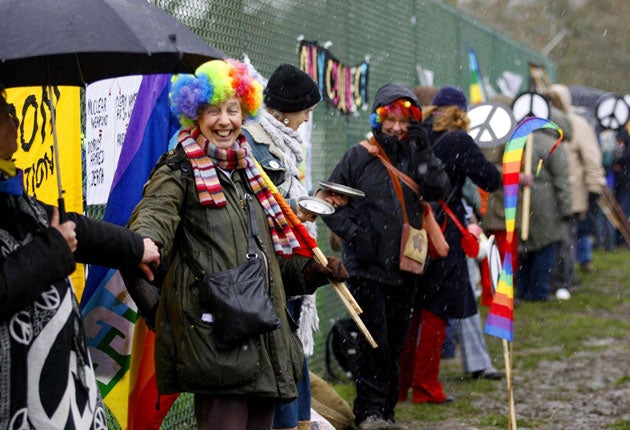Protesters to carry on camping

Your support helps us to tell the story
From reproductive rights to climate change to Big Tech, The Independent is on the ground when the story is developing. Whether it's investigating the financials of Elon Musk's pro-Trump PAC or producing our latest documentary, 'The A Word', which shines a light on the American women fighting for reproductive rights, we know how important it is to parse out the facts from the messaging.
At such a critical moment in US history, we need reporters on the ground. Your donation allows us to keep sending journalists to speak to both sides of the story.
The Independent is trusted by Americans across the entire political spectrum. And unlike many other quality news outlets, we choose not to lock Americans out of our reporting and analysis with paywalls. We believe quality journalism should be available to everyone, paid for by those who can afford it.
Your support makes all the difference.Women peace activists have been told by a judge they can continue camping outside the Aldermaston nuclear weapons site, no matter how "tiresome" the Ministry of Defence thinks they are.
The delighted demonstrators hailed yesterday's High Court judgment as a victory for the right to protest. It overturns what they described as an "absurd" bylaw banning protests outside the site.
The £900m-a-year Atomic Weapons Establishment at Aldermaston near Newbury, which makes warheads for Trident missiles, has been targeted since the Campaign for Nuclear Disarmament was founded half a century ago. Since the 1980s, the Aldermaston Women's Peace Camp (AWPC) has become a familiar feature of the local landscape.
The camp came under threat when a bylaw was introduced in 2007, banning "camping in tents, caravans, trees, or otherwise" anywhere within the "controlled area" around the perimeter fence.
The women's first appeal was thrown out, but at the Old Bailey yesterday three Appeal Court judges overturned the bylaw. The Ministry of Defence had argued it was required for national security, but the judges ruled that civil servants and ministers had failed to come up with adequate justification to deny the women their civil rights.
"Rights worth having are unruly things," said Lord Justice Laws, presiding. "Demonstrations and protests are liable to be a nuisance. They are liable to be inconvenient and tiresome, or at least perceived as such by others who are out of sympathy with them.
"Sometimes they are wrong-headed and misconceived. Sometimes they betray a kind of arrogance, an arrogance which assumes that spreading the word is always more important than the mess which, often literally, the exercise leaves behind. In that case, firm but balanced regulation may well be justified."
But he said: "In this case, there is no substantial factor of that kind. As for the rest, whether the AWPC's cause is wrong-headed or misconceived is neither here nor there, and if their activities are inconvenient or tiresome, the Secretary of State for Defence's shoulders are surely broad enough to cope."
The camp, established in 1985 as a spin off from the celebrated peace camp on Greenham Common, comes together on the second weekend of every month and lasts from Friday evening to Sunday lunchtime. All women are welcome, although men must leave when dark falls.
The appeal against the ban was lodged in the name of Kay Tabernacle, a veteran peace activist from Cardiff, whose barrister, David Pievsky, argued that it violated her rights under the European Convention on Human Rights.
Join our commenting forum
Join thought-provoking conversations, follow other Independent readers and see their replies
Comments